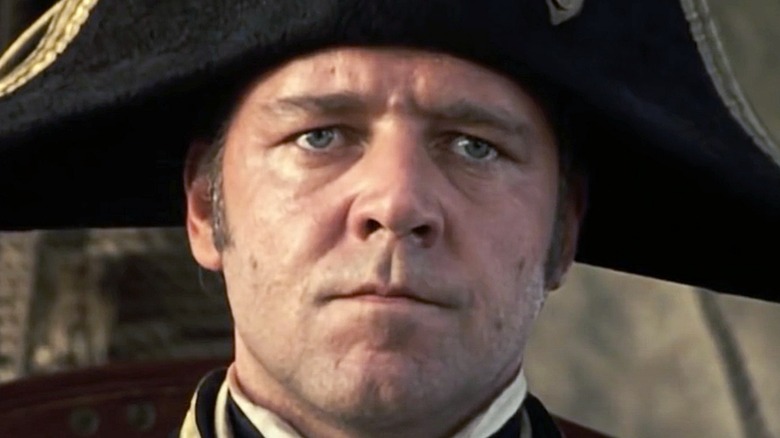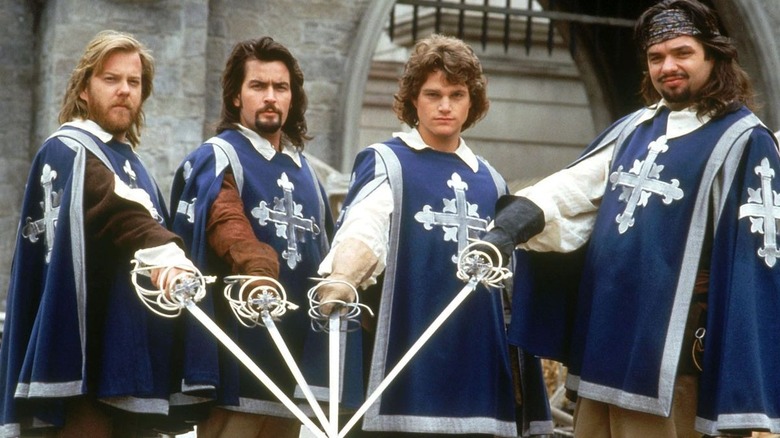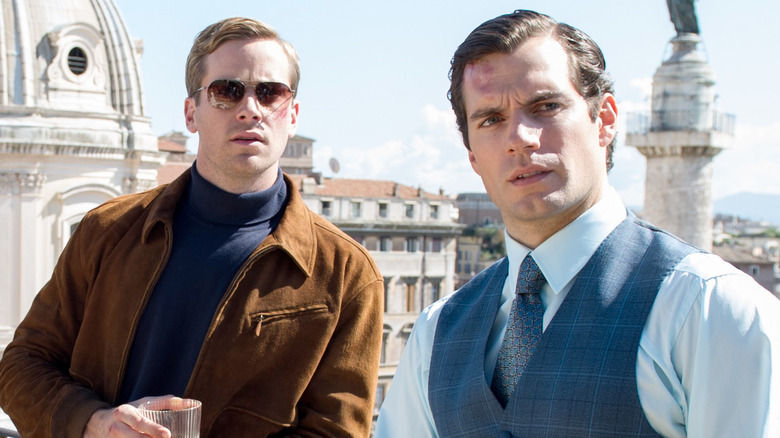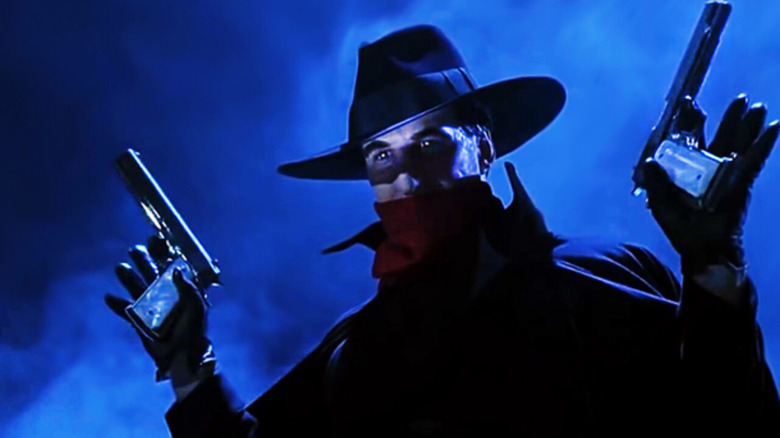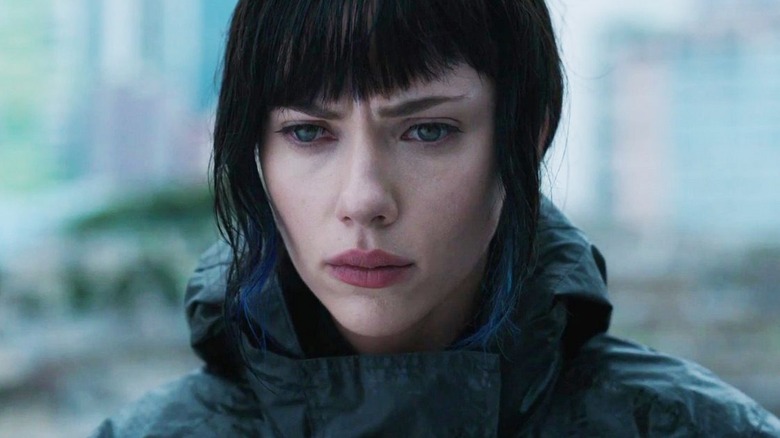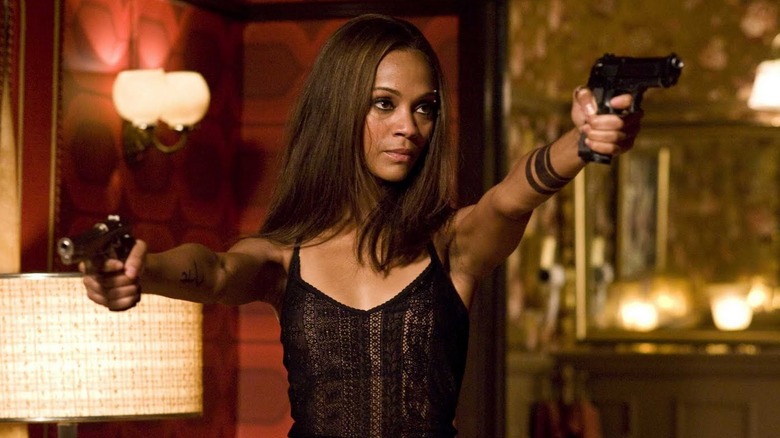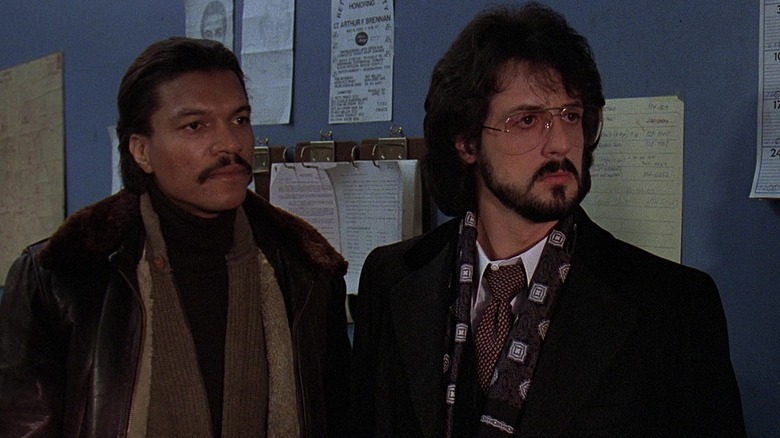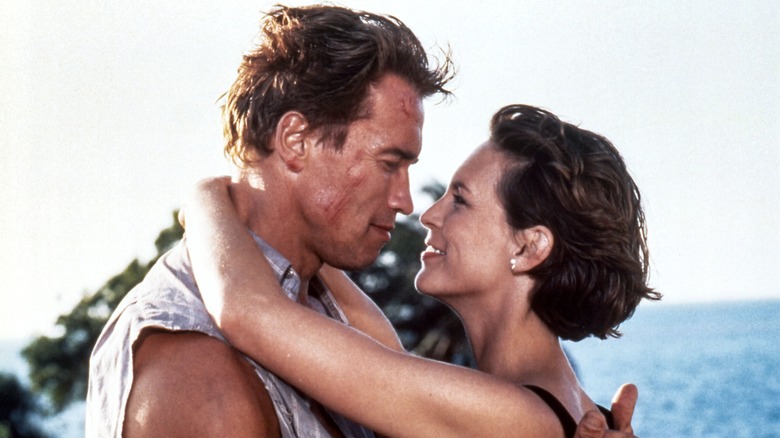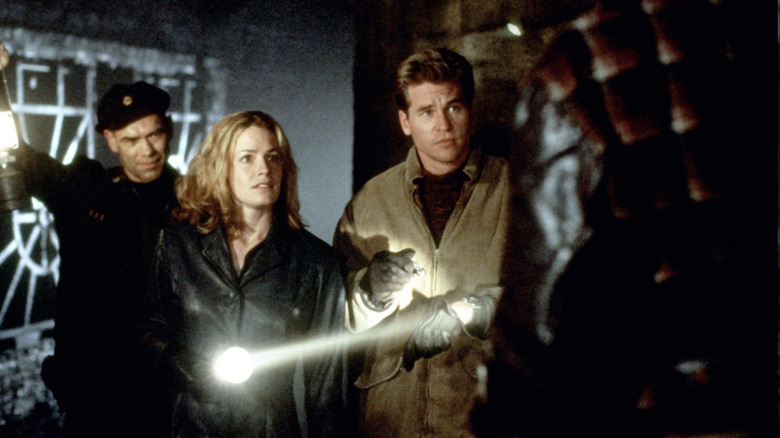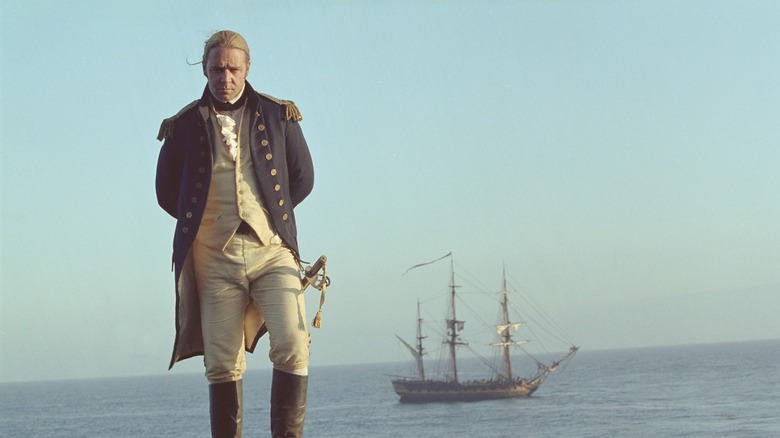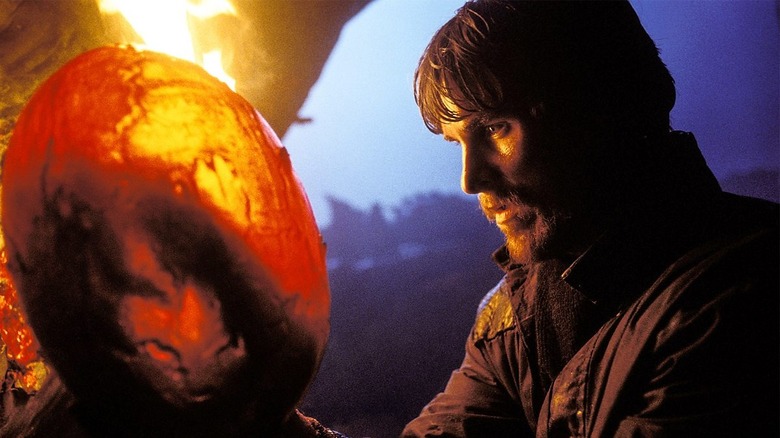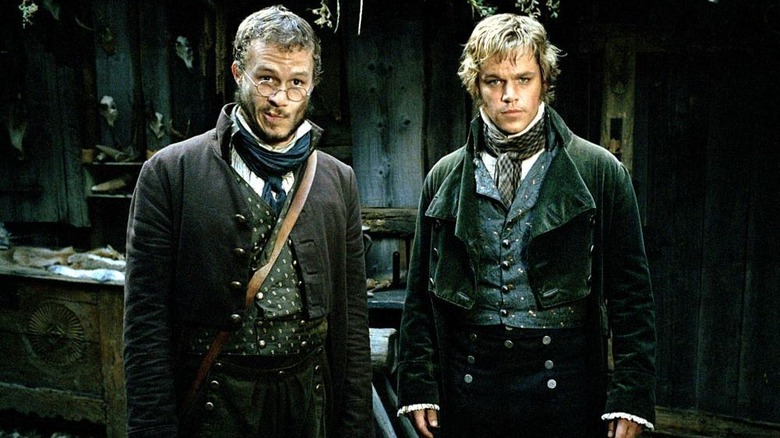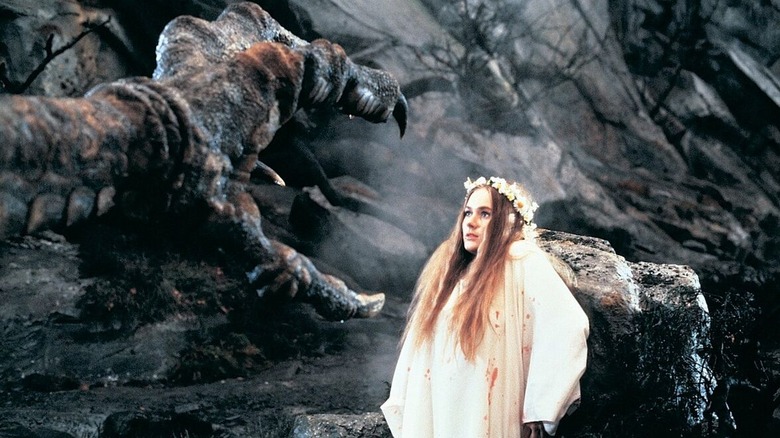12 Awesome Action Movies That Never Got Sequels
It's always unfortunate when a promising franchise is cut down in its prime. There are plenty of action franchises that have failed with later sequels — "The Highlander," "Starship Troopers," and "Die Hard," just to name a few examples. There are also sequels that completely ruined any enthusiasm for future installments; after disasters like "Speed 2: Cruise Control" and "The Whole Ten Yards," no one wanted to see those franchises continue.
A great action sequel gives filmmakers a chance to raise the stakes by building deeper emotional connection with its protagonist. The "Bourne" franchise expanded the titular character's journey of self-discovery with each installment, and the "Mad Max" series showcases Max's growth into a hero as he encounters new allies. Some great action sequels simply outdo their predecessors' set pieces. It was impressive what James Cameron accomplished on a low budget with "The Terminator," but he pushed the boundaries of CGI with "Terminator 2: Judgment Day." The "John Wick" series has continued to up the ante, as each installment has wilder and more inventive fight sequences.
Sometimes it takes multiple installments for a franchise to hone its identity. While "Mission: Impossible II" was a major disappointment, the franchise recovered and delivered four great sequels. "Indiana Jones and the Temple of Doom" was a letdown, but "Indiana Jones and the Last Crusade" rivals the original in quality.
The catch? All of these stories got a chance to continue. Either due to poor reviews, underwhelming box office, development hell, or lack of interest from the original creative teams, these awesome action movies never got the sequels they deserve.
The Three Musketeers
Stories that exist in the public domain can be adapted by any studio or artist without cost. So, naturally, there have been dozens of films starring heroes like Sherlock Holmes, King Arthur, Robin Hood, Zorro, and Tarzan. Similarly, the story of the Three Musketeers has been retold countless times, most recently by Paul W.S. Anderson in 2011. However, few films have nailed the tone of Alexander Dumas' novel, and Disney's 1993 version remains one of the stronger adaptations. Stephen Herek's lighthearted romp is fun, heartfelt, and features incredible sword fighting sequences.
The film recounts the classic story of the comically aloof fencer D'Artagnan (Chris O'Donnell), who travels to Paris in search of adventure. Haughty and arrogant, D'Artagnan spars with the three titular swordsmen, Athos (Kiefer Sutherland), Aramis (Charlie Sheen), and Porthos (Oliver Platt). All four leads are very charismatic. O'Donnell is perfectly cast as a goofy adolescent in over his head, and Sutherland handles Athos' tragic backstory with the appropriate dramatic weight. Sheen and Platt are very over-the-top, but it fits within the film's comedic tone.
Dumas wrote multiple adventures featuring these characters, but unfortunately the film drew negative reviews. While critics like Roger Ebert criticized the simplification of Dumas' novel, a great sequel could have deepened the relationships between the characters.
The Man From U.N.C.L.E.
The cinematic adaptation of the '60s buddy spy series "The Man from U.N.C.L.E." spent years in development hell before finally reaching the screen. Quentin Tarantino was just one of the directors offered the chance to direct it, and actors like George Clooney, Bradley Cooper, Tom Cruise, Jon Hamm, and Ryan Reynolds were all considered for the role of the charismatic American secret agent Napoleon Solo. Guy Ritchie's version finally reached theaters in 2015 with Henry Cavill as Solo, Armie Hammer as KGB assassin Illya Kuryakin, and Alicia Vikander as the illustrious mechanic Gaby Teller.
2015's "The Man from U.N.C.L.E." is a fun throwback that perfectly utilizes Ritchie's signature style. The dialogue is sharp and clever, winking at the original series with a satirical slant. The three leads have terrific chemistry, and Cavill in particular gives one of his best performances to date. Cavill's version of Superman was overtly grim and serious, and for the first time the actor got to show a more charismatic, playful side to his personality. Solo charms his way around potential dangers, flirting with women and delivering amusing one-liners. Solo's checkered past also gives him more complexity than the original show ever dared.
The film was intended to be a major franchise for Warner Brothers, but it was a huge flop. Although a sequel was being written by screenwriter Lionel Wigram, it seems unlikely to ever reach production, despite Cavill's enthusiasm.
The Shadow
Superhero films were in a very different state in the '90s than they are today. Although the "Batman" and "Teenage Mutant Ninja Turtles" franchises were wildly popular, comic book adaptations didn't dominate pop culture. Many superhero films intended to launch recurring franchises weren't able to continue due to poor box office performance. Planned sequels to 1994's "The Shadow," for example, were cancelled after the film underperformed.
That's a shame, because "The Shadow" is a unique combination of action and noir that hones in on its classical influence; fans of "The Rocketeer" in particular should give this underrated film a shot. It's an adaptation of the classic serial character who has appeared in many novels, comics, and radio dramas since 1930. Lamont Cranston (Alec Baldwin) is a former drug lord given a shot at redemption when he's granted immortality. Going by the name of the Shadow, Cranston has the power of hypnotization, invisibility, and increased combat abilities.
Cranston has a public front as a Bruce Wayne-esque billionaire playboy, and stalks the streets of New York City every night in search of criminals. Baldwin channels Cranston's brooding nature, but is believable as an eccentric aristocrat. Jerry Goldsmith's amazing score further adds to the old school feel. The depiction of female characters was progressive compared to other films from the era; Penelope Ann Miller's Margo Lane easily sees through Cranston's deceit and becomes his ally.
Ghost in the Shell
Sometimes a sequel can allow a franchise to course correct from mistakes made in the first installment. The 2017 adaptation of the iconic anime "Ghost in the Shell" was problematic due to the casting of Scarlett Johansson as the Japanese character Major Mira Killian. It would be one thing if the film had taken place in a different location, but "Ghost in the Shell" retains the original's Japanese setting and employs a primarily Japanese cast. The film's attempts to explain Major's origins make it even worse; instead of leaning into the character's cyborg nature, the ending reveals that she lives in the body of a Japanese woman named Motoko Kusanagi.
It was an unfortunate situation, because otherwise "Ghost in the Shell" is a thrilling adaptation. Director Rupert Sanders delivers extraordinary cyberpunk action sequences, including an amazing opening set piece in which Major infiltrates a skyrise. Takeshi Kitano is captivating as the villainous Chief Daisuke Aramaki, and Kaori Momoi's performance as Kusanagi's mother Hairi gives the film deeper emotional weight. The techno-infused score by Clint Mansell and Lorne Balfe is striking, and the depiction of a dystopian metroplex is distinctly stylized when compared to other live-action manga and anime adaptations.
A sequel that recast Johansson could retain the first film's positive qualities. The anime film's 2004 sequel "Ghost in the Shell 2: Innocence" is equally brilliant, and could be the basis for a thrilling live-action interpretation if the whitewashing was eliminated.
The Losers
DC Comics might be best known for Superman, Batman, Wonder Woman, and the Justice League, but adaptations of lesser-known DC properties have been equally as effective. Films like "Road to Perdition," "V for Vendetta," and "A History of Violence" are all based on comics published by DC and its various imprints, but while those all stand alone, 2010's "The Losers" was primed to launch a cool franchise. "The Losers 2" was in active development before the first film's release, but plans were scuttled after the original bombed at the box office. Warner Brothers devoted a major marketing campaign to the film, but its premise was seen as too similar to the remake of "The A-Team," which was released during the same summer movie season.
Based on the Vertigo Comics series by Andy Diggle and Mark Simpson, "The Losers" follows a quirky group of covert operatives employed by the United States Special Forces. Captain William Roque (Idris Elba) is an experienced weapons expert, and his assembled team includes the Bolivian spy Aisha al-Fadhil (Zoe Saldana), military-minded Lieutenant Colonel Franklin Clay (Jeffrey Dean Morgan), and wisecracking computer hacker Captain Jake Jensen (Chris Evans). The morally grey mercenaries aren't traditionally heroic. However, "The Losers" is distinct because it doesn't feature science fiction or fantasy elements.
"The Losers" is a blast, and the cast has fun chemistry as they bicker and argue. It's particularly amusing to see Evans as a foul-mouthed comedic character, the polar opposite of Steve Rogers.
Nighthawks
Sylvester Stallone has proven that he can make recurring franchises work. Stallone drew acclaim for his inspirational boxing drama "Rocky" and his post-Vietnam action thriller "First Blood," and continued to develop the characters with future installments. While both the "Rocky" and "Rambo" franchises grew sillier with each installment, a majority of the sequels were successful while maintaining the essence of the characters. Stallone even received a late career resurgence when he returned to the "Rocky" universe for the spinoff series "Creed."
One of Stallone's most underrated films, 1981's "Nighthawks," never got the same opportunity. The gritty crime thriller stars Sly as the brooding New York Detective Sergeant Deke DaSilva. DaSilva and his partner Sergeant Matthew Fox (Billy Dee Williams) specialize in solving violent crimes, and they're tasked with tracking down the terrorist Wulfgar Reinhardt (Rutger Hauer). Compared to some of the sillier performances Stallone gave in his later career, "Nighthawks" is much more dramatic. Williams didn't many memorable roles after playing Lando Calrissian in the "Star Wars" series, which is unfortunate considering his charismatic presence.
The streaming service Peacock is planning a television reboot of the film produced by Stallone, but it would still be exciting to see a direct sequel. Stallone has shown continued success in developing new franchises with projects like "Escape Plan" and "The Expendables," while Williams returned to the big screen with a memorable role in "Star Wars: Episode IX — The Rise of Skywalker."
True Lies
James Cameron is one of the greatest action filmmakers of all time, but his process of developing sequels has always been slow. After his game changing low-budget sci-fi thriller "The Terminator" wowed audiences in 1984, Cameron spent seven years developing the advanced CGI needed for "Terminator 2: Judgment Day." "Avatar 2" will finally hit theaters in 2022, 13 years after the first installment, and following a number of release date bumps.
After the success of Cameron's 1994 spy comedy "True Lies," a sequel seemed likely. The film was a smash hit, and it ended on an intriguing note that laid the groundwork for future films. Arnold Schwarzenegger's secret agent Harry Tasker learns to be more honest with his wife Helen (Jamie Lee Curtis), and the prospect of the two working together on further adventures was exciting.
A sequel was in active development throughout the '90s, but unfortunately, real life tragedy changed the expectations for the sequel. After 9/11, the idea of urban terrorism in an action-comedy seemed insensitive. Curtis recently stated that "True Lies 2" would not be possible, and Cameron also ruled out the possibility. It's unfortunate, because Curtis has had a recent comeback with the new "Halloween" sequels, and Schwarzenegger still actively works. It would also be exciting to see Eliza Dusku return as their daughter Dana; following "True Lies," Dushku appeared as Faith on "Buffy the Vampire Slayer," becoming a bona fide star in the process.
The Saint
The recent documentary "Val" has caused many viewers to look at Val Kilmer's career from a new perspective. Kilmer enjoyed giving challenging performances, but struggled with personal health issues later in life. It was a challenge for him to continue acting, but that won't stop him from appearing in the upcoming sequel "Top Gun: Maverick."
One of Kilmer's favorite roles was professional thief Simon Templar in the 1997 film "The Saint." A reboot of the iconic British television series that starred Roger Moore, "The Saint" follows a master of disguise who orchestrates elaborate heists across the globe. Templar's different disguises are eccentric, and Kilmer had a blast portraying all the different characters he embodies. Templar's origin story is complex; raised in a restrictive Catholic orphanage, he rebels against his abusive caretakers and flees at a young age. His titular moniker is an homage to his religious upbringing.
"The Saint" wasn't given the credit it deserved when first released, and was met with mostly negative reviews despite the moderate box office success. It's unlikely that a sequel will happen now — it's unfortunate that the initial blowback prevented Kilmer from playing Templar again. Instead, Paramount Pictures is moving forward with a remake from "Rocketman" director Dexter Fletcher starring "Bridgerton" breakout star Regé-Jean Page.
Master and Commander: The Far Side of the World
Peter Weir's epic naval adventure "Master and Commander: The Far Side of the World" is a masterpiece, and features the greatest performance of Russell Crowe's career. The film adapts the first three novels in author Patrick O'Brian's Aubrey–Maturin series, which follow the adventures of British Naval Captain Jack Aubrey throughout the Napoleonic Wars. Weir shot the film in the open sea and meticulously recreated era-accurate ships; the naval combat sequences are some of the most gripping ever seen on film.
"Master and Commander" was hailed as one of the best films of 2003, receiving ten Academy Award nominations, and winning for best cinematography and best sound editing. Unfortunately, it was only a moderate box office success and barely made back its budget. Crowe recently tweeted about his love for the film, and defended it from rude critics.
While recently it was announced that "A Monster Calls" screenwriter Patrick Ness is developing a prequel, there's been no official confirmation that another Aubrey adventure has been greenlit. O'Brian's series has 20 novels with many exciting adventures that would work well on the big screen; hopefully the film's resurgence in the public consciousness will spark renewed interest in the series. It would be exciting to see Weir return. One of the most versatile filmmakers of his generation, Weir hasn't directed a film since 2010's "The Way Back."
Reign of Fire
"Reign of Fire" is an underrated gem. It takes place in a universe where London construction workers inadvertently awaken a colony of mythic dragons that have been dormant in the city's tunnels since the Medieval era. The dragons emerge, causing devastation and forcing mankind to abandon its major metropolitan centers. "Reign of Fire" picks up two decades after the initial disaster; the survival of the human race rests in farming colonies where survivors band together.
Quinn (Christian Bale) witnessed the early breakout as a child, and watched as his parents were engulfed in flames. He leads a peaceful colony at Bamburgh Castle, and protects other survivors alongside his best friend Creedy (Gerard Butler). Quinn doesn't think that fighting the dragons is wise, and he's disturbed when a sect led by the American Denton Van Zan (Matthew McConaughey) tries to convince him to join their quest to hunt the beasts down. After reluctantly joining Van Zan's team, Quinn personally slays a dragon. The two groups join forces.
"Reign of Fire" was a massive box office bomb, and reviews were not kind. However, McConaughey recently released an ambiguous tweet with a clip from the film, and "Reign of Fire" has earned a cult fanbase in the years following its release – director Rob Bowman recently reflected that he's often approached by loyal fans. It's a unique film worthy of reconsideration.
The Brothers Grimm
Terry Gilliam is an incredible filmmaker, but the process of creating "The Brothers Grimm" was not an easy one. Gilliam feuded with the Weinstein brothers throughout the film's production, and the tensions delayed the film's release multiple times. Gilliam was ultimately unsatisfied with the end product, and audiences seemed to share his sentiments. After an extensive marketing campaign, the film underperformed.
"The Brothers Grimm" was inspired by classic fairy tales, and follows con artist brothers Will (Matt Damon) and Jake (Heath Ledger) as they deceive gullible townsfolk into thinking they're experienced demon hunters. When they discover that many of the mythological creatures they've faked are real, the brothers are forced to actually become heroes.
Although "The Brothers Grimm" was not the film Gilliam envisioned, it's still a very enjoyable lampoon of fantasy-action clichés. A sequel made without the influence of the Weinsteins could have given Gilliam the chance to properly realize his story. Gilliam rarely gives up on his passion projects — just look at the tumultuous history of "The Man Who Killed Don Quixote." Unfortunately, the tragic passing of Ledger makes "The Brothers Grimm 2" impossible.
Dragonslayer
After remaining mostly dormant in mainstream filmmaking, the fantasy genre is making a comeback. "Game of Thrones" became the most talked about series on television throughout its run, and "The Witcher" quickly became one of the most popular shows in Netflix's history. The resurgence has prompted reflection on some of the underrated action fantasy gems of the '80s; "Willow" was initially thought of as a disappointment, but it's now receiving a sequel series on Disney+.
As such, it's a better time than ever to look back at the underrated 1981 classic "Dragonslayer." The film takes place in the mythic sixth-century kingdom Urland, which is terrorized by the ancient dragon Vermithrax Pejorative. King Casiodorus (Peter Eyre) theorizes that the only way to protect the colony is to offer sacrificial virgins to the creature, but the young sorcerer Galen Bradwarden (Peter MacNicol) aims to slay the beast after receiving a mystical amulet. Galen has trained in the arts of magic under his mentor, Ulrich (Ralph Richardson).
"Dragonslayer" was a box office failure, but it drew a loyal cult fanbase. The influence of "Dragonslayer" continues to live on; Guillermo del Toro cited the film's creatures among his favorites, David Lowery was inspired by the film's quest narrative when creating "The Green Knight," and George R. R. Martin ranked it as one of the greatest fantasy films ever made. It would be a great time for a legacy sequel.
